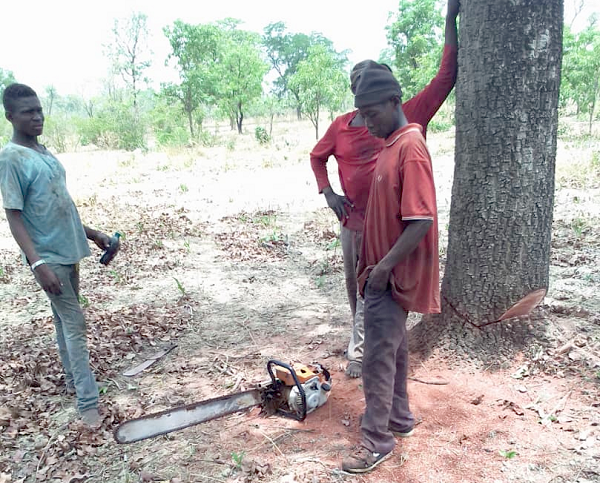
Salimana Forest Reserve under siege; Illegal chainsaw operators wantonly felling trees
The Salimana Forest Reserve in the Wa West District of the Upper West Region, which covers about 6,000 hectares, is under siege by illegal chainsaw operators.
The reserve was created to conserve the natural ecosystems necessary for the maintenance of the flora and fauna species including Roan Antelopes, Water Bucks, Kobs, Bushbucks, Butterflies and Northern Carmine Bee Eaters.
Advertisement
However, the chainsaw operators have formed their own task force who are armed to the teeth and operate under the cover of darkness felling the trees which include Rosewood, Shea, Dawadawa and Baobab trees in the forest with impunity without any respect for the law.
Checks by the Daily Graphic show that although several measures have been taken by the local communities to halt the indiscriminate and illegal activity of the operators, they have been equally resistant to the measures with a well-orchestrated network with the connivance of some traditional rulers and elders.
Recently, a section of the vigilant youth of the Gbache Electoral Area near Dorimon intercepted a quantity of illegally sawn trees including Rosewood and other species of commercial importance such as Shea, Dawadawa and Baobab trees in the forest and wanted to seize them but the chainsaw operators forcibly collected them.
When interrogated, they claimed to have an official permit from the Forestry Commission and rights to the concession to fell trees in the forest.
Reinforced measures
However, the Assembly member of the Gbache Electoral Area, Mr Peter Seidu Kaadaare, has deplored the conduct of the chainsaw operators and said measures had to be reinforced by the security services to clamp down on their nefarious activities before they got out of hand.
Mr Kaadaare alleged that although he made a complaint to the Wechiau Police about the recalcitrant behaviour and subsequent clash between the youth and operators, no action had been taken by the police.

Some planks sawn from an illegally felled tree
"The police officers I met complained of the low strength of personnel and, therefore, advised me to involve the Forestry Commission and the Unit Committee members who will monitor any chainsaw activity in the area," he said.
Mr Kaadaare said after forming a task force, in collaboration with the Unit Committee members, the operators had now changed their modus operandi by transporting the sawn timber beams in a canoe across the Black Volta Lake in the night.
Indiscriminate tree felling
This phenomenon of indiscriminate cutting of trees resulting in climate change, deforestation, environmental degradation and bushfires presenting a potential threat to human survival is not only experienced in the Wa West District but across the region.
While checks indicated that the Gbele Resource Reserve established in 1975 and is the largest in the region covering a land size of 565 square kilometres has not yet been touched by the chainsaw operators, it behoves the authorities to ensure that large reserve is protected. The fairly new reserve adjoins the Mole National Park in the Savannah Region and spans across three districts, namely the Sissala East, Sissala West and Daffiama / Bussie / Issa ( DBI ).
Development headache
Considering the fact that the region is the poorest and most deprived, these additional problems have presented a daunting task to development partners and the government to confront, instead of planting trees and nurturing them to maturity as a means to preserve the environment and increase the forest cover.
During the harmattan season, for instance, the Baobab tree, which grows up in the wild forest and is held in high esteem, plays a vital role in the economic and nutritional values of many households.
While the fresh leaves are sold to augment households’ budget, it is also used to prepare delicious soup. The fruits are also edible.
So, it is with the other commercial species including the Shea and Dawadawa trees, which are alternatives to unavailable food during the harmattan as well as a means of livelihood.
Throughout the northern sector, there is only one rainfall season occurring between May and October after which there is a prolonged period of dry season.
During this period, daily temperature is very high resulting in the incidence of Cerebrospinal Meningitis (CSM) cases. This goes to buttress the fact that there is the need for the country to prepare for the future by paying particular attention to the protection of trees, since they are very important for the survival of both human beings and animals.



